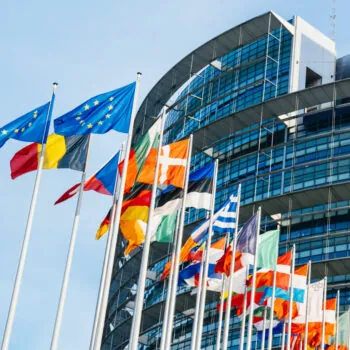Border carbon adjustments (BCAs) are technically difficult to design and politically challenging to implement. If BCAs are going to succeed, the European Union (EU) will need to engage trade partners from the start.
The EU needs a strategy and a credible offer to encourage other countries to partner with it on design and implementation.
The idea behind BCAs is relatively simple: the EU would impose a charge on goods imported into the EU from foreign producers who operate without a carbon price to protect its domestic producers, who face a carbon price, from being undercut. In practice, however, designing and implementing BCAs requires overcoming a seemingly endless list of technical, legal and above all political challenges.
Despite the many concerns voiced by experts and the fact that there are other tools that could achieve the same ends more effectively, the European Commission (EC) is moving forward at pace with its plans to make BCAs a reality.
In her State of the Union address last month, Commission president Ursula von der Leyen reiterated her plans to introduce BCAs to “motivate foreign producers and EU importers to reduce their carbon emissions”. The Commission has launched its second public consultation on the topic and at the July European Council, heads of state and government mandated the Commission to put forward a proposal for BCAs in the first half of 2021.
But for all these signals and the seemingly fast-moving timeline, there is a long road ahead. We are still far from seeing this controversial measure implemented.
Three sets of hurdles
The technical challenge is immense. Policymakers must make a series of decisions: What sectors to include? What scope of emissions? How to assess the carbon content of products produced in third countries? The broader the scope, the larger the data gathering and verification exercise.
The political challenges are manifold. Within the EU, member states and industries hold vastly different expectations for how a BCA should be designed. France, the Netherlands and Spain have come out as champions. Germany with its more export-oriented industries has struck a more cautious note, raising concerns over sparking a trade war.
On the legal front, there are two main sets of constraints. First, WTO rules against protectionist measures. Second, the principle of common but differentiated responsibility in UNFCCC negotiations, whereby countries have a shared but not equal responsibility to take climate action. BCAs, depending on how they are designed, could theoretically impose an equal responsibility on all trade partners to match the EU’s environmental standards.
International challenges
Internationally, trade partners have been quick to decry BCAs as protectionist measures that are unlikely to be in line with World Trade Organisation (WTO) rules. The risk of retaliatory trade measures is high. Indeed, the EU has some experience with this. In 2012, the EU was forced to “stop the clock” on the introduction of international aviation into the EU ETS, due to a concerted backlash from major trade partners.
The EU is clearly targeting major economies—China, the US and Russia—with its call for enhanced climate action and BCAs have been useful in keeping high-level political attention on climate in these economies. In Russia, president Vladimir Putin’s top advisor on climate warned big businesses that they need to start preparing for harsher EU rules or face difficulties selling products.
But the politics of BCAs have only become more complicated in the wake of the covid-19 outbreak. With true commitment to multilateralism being put to the test and countries around the world focused on dealing with this crisis, putting forward BCAs as an ‘incentive’ for climate action risks being seen as overly punitive. BCAs could impact a number of emerging and developing economies for whom this approach will seem particularly unfair in the current context, unless they are accompanied by extensive cooperation and capacity building measures.
Cooperation is key
If the EU is serious about implementing BCAs, it must also get serious about engaging with trade partners on this issue. There is no point designing the perfect mechanism, only for it to be dead on arrival because the EU has not laid the groundwork for a cooperative approach.
Significant diplomatic effort will be required to demonstrate that BCAs do not amount to protectionism and to explain their true—and limited—impacts on trade. The Commission should ensure that the analysis of the cross-border effects of BCAs are integrated into impact assessments for these policies. Such an assessment would need to focus on developing countries and on major trade partners.
The EU should also try to develop a coalition with other jurisdictions that are seriously engaging in carbon pricing and/or have signed up to pledges to decarbonise heavy industry. The EU will also need to engage in dialogues with developing countries on how BCAs might affect them and what technical and financial assistance measures might be taken to manage any impacts.
Finally, the EU should seek to turn the potentially negative issue of BCAs, into a broader and more positive discussion with international partners on how to accelerate the decarbonisation of heavy industries. BCAs should be addressed as part of a set of issues, including coordination on ambition, technology, standards, policy learnings and sustainable finance to help develop zero carbon industrial sectors in partner countries.
China’s announcement that it will aim for carbon neutrality by 2060 is a chance to put a more cooperative approach into practice. The Chinese government has signalled that it will speed up the pace of its carbon market development—rolling it out to heavy industry sectors, steel, cement and petrochemicals. These are sectors that would theoretically be impacted by an EU BCA.
The EU has an opportunity to engage in a dialogue with China on the policies needed to meet its ambitious pledge, including strengthening its carbon market. BCAs or the development of other anti-carbon leakage measures, such as product requirements, could be one plank of that conversation.
Von der Leyen has spoken about BCAs as a measure of last resort, to be deployed if other countries and regions do not live up to the EU’s climate ambition. China’s surprise pledge gives the EU an opportunity to more clearly articulate the carrot to the BCA stick.


